Introduction:
This world of advancement is making mobile app development a necessity for every business. Thus, increasing the number of development processes and framework to support the development.
When choosing a framework for their applications, developers have several options as mobile app development continues to advance. Ionic and React Native are two well-liked frameworks that have surfaced in recent times. React Native and Ionic both have advantages and disadvantages. Which is the best fit for a given project will rely on its individual requirements.
This blog will cover a detailed comparison of React Native vs Ionic by explaining the basics, features, advantages, suitability of both the frameworks.
To make a better decision in choosing between these options, let's dive into the details:
What Is Mobile Enterprise Application Development, And What Does It Entail?
Enterprise application development is becoming more agile and collaborative, with IT working with internal business teams and external agencies to produce apps that better understand and incorporate the demands of end-users. The growing use of cloud technology has made this possible.
Businesses have traditionally built software by hiring React native or ionic developers from India following a lengthy, strict waterfall method. This was mostly due to technological restrictions. Individual processes of the application development lifecycle were stiff and compartmentalized with on-premise alternatives employing Java, .Net, and other solutions, preventing collaboration and quick iteration.
Furthermore, the development of these applications was frequently challenging and costly. According to 76 percent of IT experts, developing an app takes at least three months on average. Every application required IT to put up infrastructure, assure uptime, availability, security, and scalability. This contributed to the difficulty of developing and maintaining apps.
Organizations were obliged to cope with developer shortages in addition to development time constraints. A scarcity of mobile developers affects 37% of businesses, while a knowledge gap in critical development abilities affects 44%. As a result, in-house developers and IT teams frequently find themselves unable to meet demand. Backlogs of development projects are reported by 62 percent of IT workers that build apps.
In short, conventional application development required a large amount of time, infrastructure, and tool investments. With the growing needs of the connected world, such strategies are even less practicable. With the emergence of cross-platform services, all of that is changing.
The Fundamentals of React Native
React Native application development is a cross-platform solution for developing native iOS and Android mobile apps. It's made with React and JavaScript. Facebook made it open-source in 2015, and it has exploded in popularity since then.
On both iOS and Android, React Native is used to creating native mobile apps using JavaScript and React.
The Fundamentals of Ionic
Ionic is a hybrid platform for creating Ionic app development. It enables you to create high-quality, cross-platform apps using popular web technologies such as JavaScript, HTML, and CSS. Ionic Framework has made a free eBook available that covers the distinctions between hybrid and native apps.
The concept is that you write code once and it can be deployed on iOS, Android, the web, and desktop. All of the platforms have the same code base.
Businesses looking for mobile app development get confused between Ionic and React Native. This is because they do not have the basic understanding of Ionic vs React Native.
So, let’s discuss the React Native vs Ionic in detail:
Features of React Native and Ionic
The features given below will allow you to compare ionic native vs react native frameworks easily.
Features of React Native:
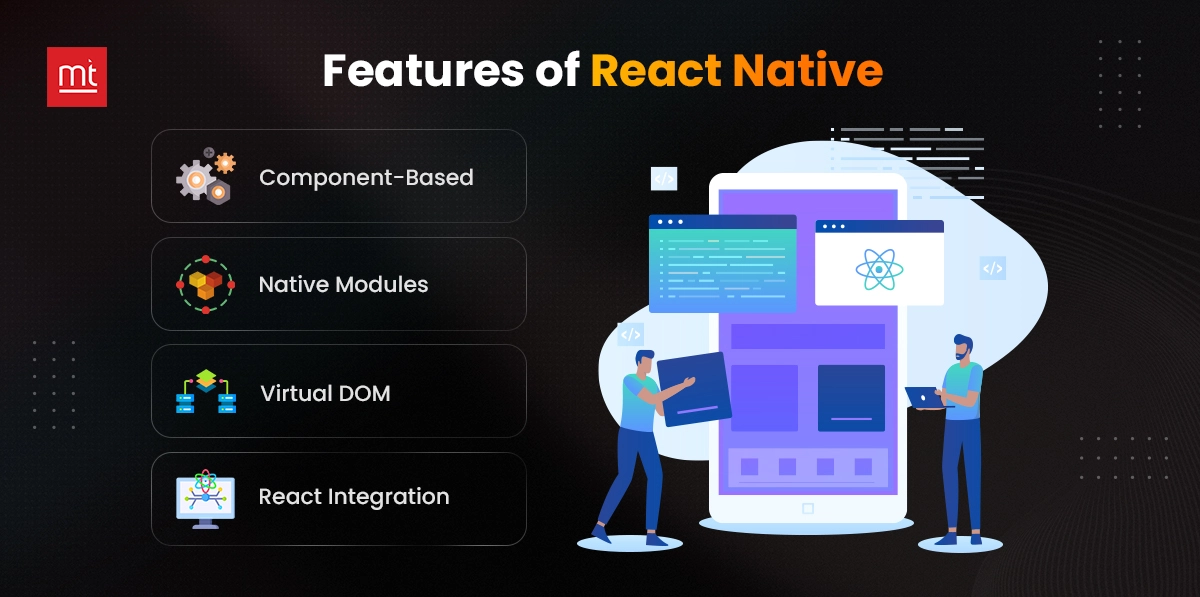
- Component-Based: React uses a component-based architecture in which reusable components are used to build the user interface. The maintenance of code and reusability are highly supported by React native.
- Native Modules: By giving developers access to native modules and libraries, react makes it possible for them to incorporate device-specific capabilities seamlessly into their app.
- Virtual DOM: It leverages a virtual DOM to boost app speed by minimizing pointless DOM changes, much like React for the web.
- React Integration: Since it closely follows React, developers who have good hands on react find it easy to use and build.
Features of Ionic:
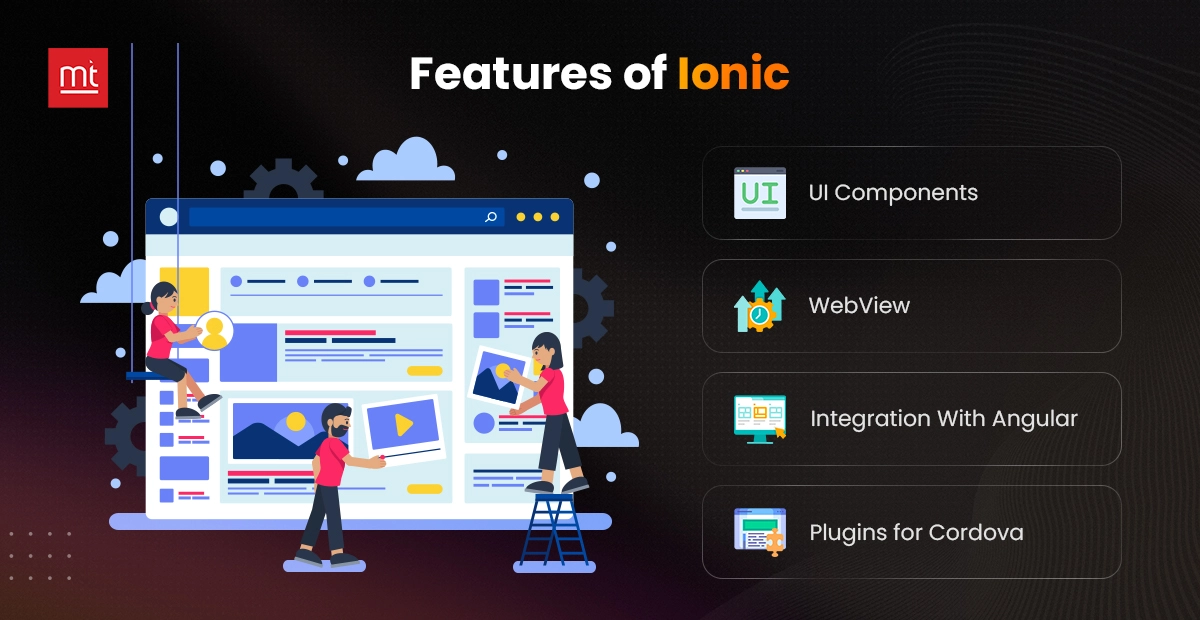
- UI Components: It offers a wide collection of pre-build UI components and elements that allows the developers to enhance the appearance and overall look of the app.
- WebView: Ionic apps are basically web apps that operate inside a native app shell-encased WebView component. This makes it possible for developers to create apps using web technologies.
- Integration with Angular: Ionic is among the best mobile app development platforms which has good compatibility with Angular. This offers a well-organized and structured development environment.
- Plugins for Cordova: It uses Cordova plugins to provide better integration and connection between web technologies and native code. This allows access to device-specific features and native operations.
Advantages and Disadvantages of React Native
Understanding the advantages and disadvantages of react native will ensure businesses know react native vs ionic framework better:
Pros of React Native:
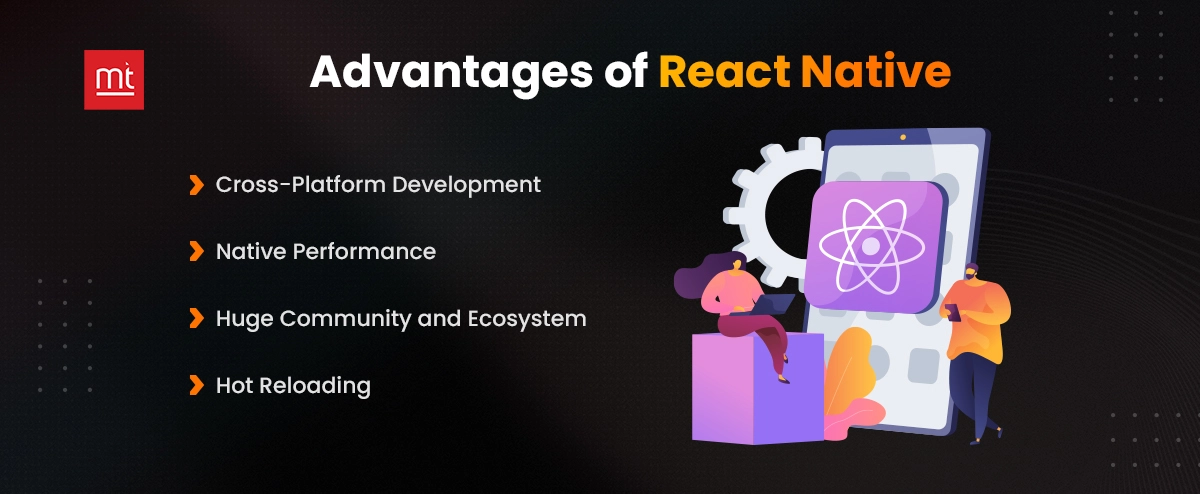
- Cross-Platform Development: It allows the developers to use a single codebase for both iOS and Android platforms, reduces manual code designing and ultimately saves time and resources. Thus, making the process much faster.
- Native Performance: It uses native components and code optimization methods that make its performance better.
- Huge Community and Ecosystem: A large community provides a wealth of tools, libraries, and resources that improve development productivity and facilitate problem-solving.
- Hot Reloading: The fast reloading feature of this framework allows the developers to see changes instantly without having to recompile the app again and again, hence the development is faster.
Cons of React Native:
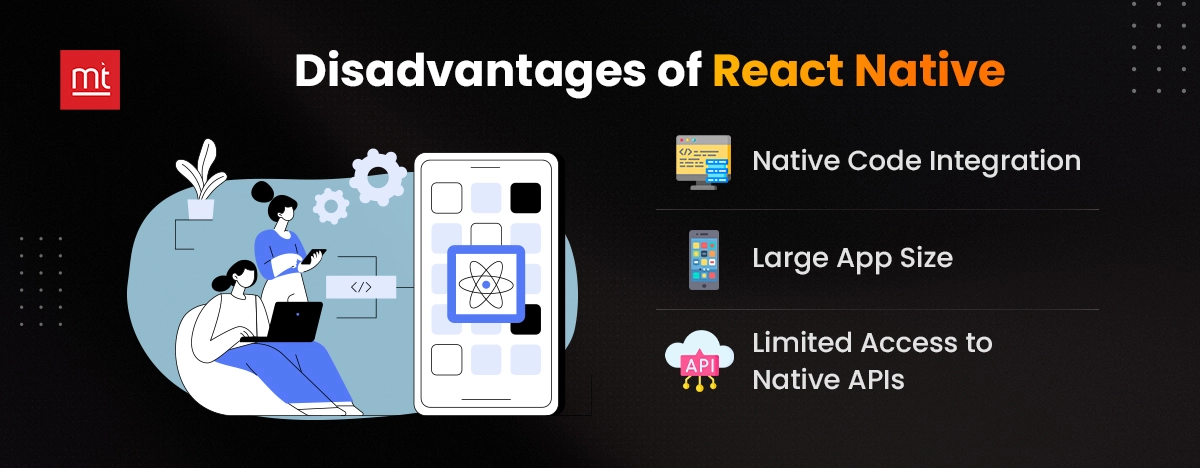
- Native Code Integration: Complex integration with native modules can sometimes be difficult, necessitating additional development effort.
- Large App Size: This framework apps have a bigger file size than completely native apps, which may be an issue for customers with restricted storage.
- Limited Access to Native APIs: Access to some native APIs may necessitate special module development, thereby complicating the project.
Advantages and Disadvantages of Ionic
Let’s discuss the advantages and disadvantages of Ionic app development platform and conclude ionic vs react native performance difference:
Pros of Ionic:
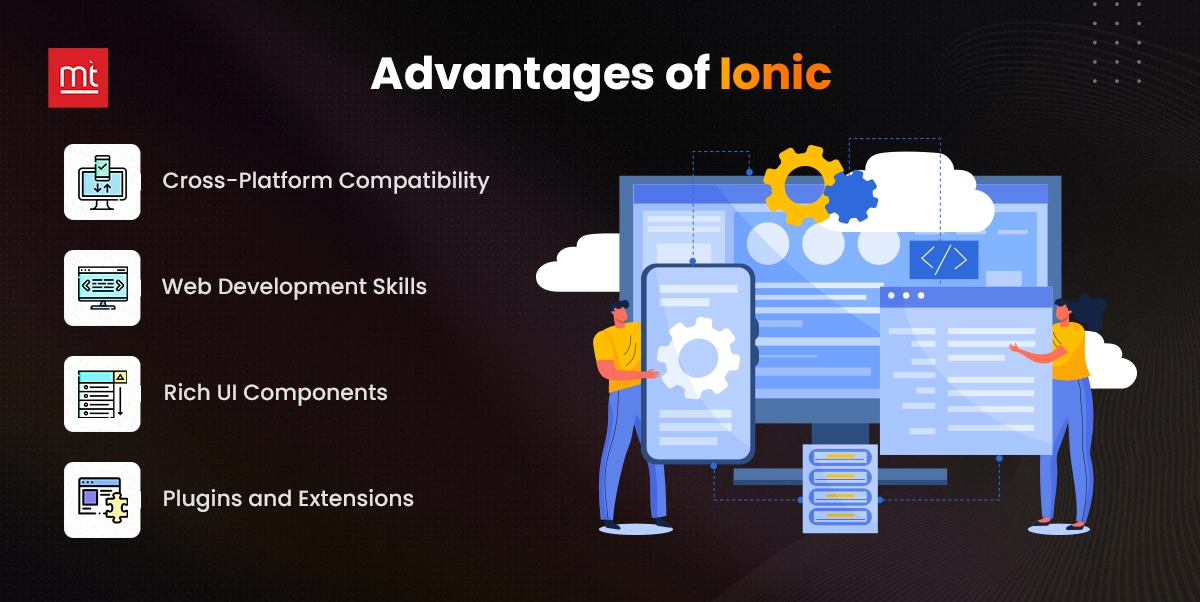
- Cross-Platform Compatibility: This feature saves time and resources for developers by allowing them to write code only once and deploy it to both the iOS and Android platforms.
- Web Development Skills: Since Ionic apps make use of well-known HTML, CSS, and JavaScript, developers with a background in web technologies can easily switch to creating Ionic apps.
- Rich UI Components: It minimizes the requirement for substantial bespoke UI development by providing a sizable library of pre-designed UI components.
- Plugins and Extensions: Ionic apps can access native functionality and device features by using a variety of Cordova plugins.
Cons of Ionic:
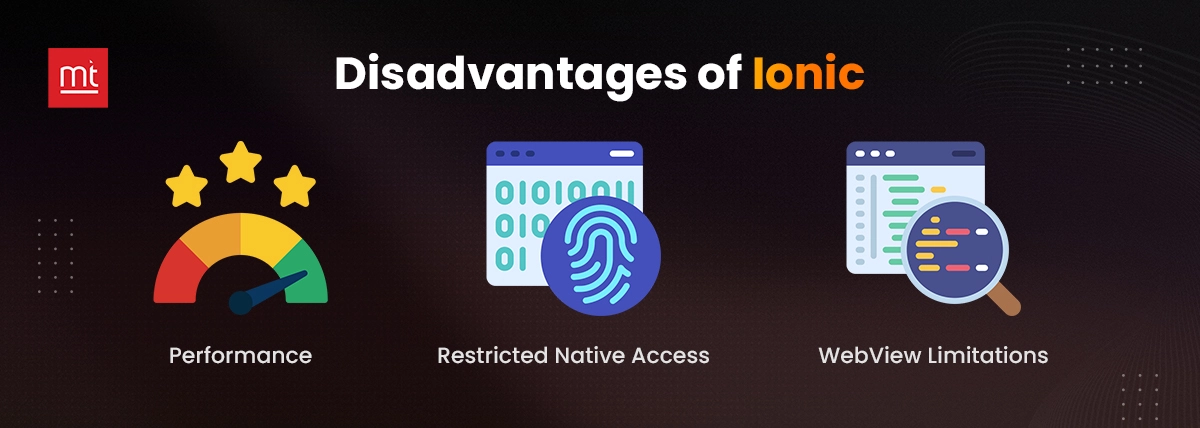
- Performance: Apps built on this framework may not consistently attain the same level of performance as fully native apps, especially when it comes to graphically intense or feature-rich applications.
- Restricted Native Access: The project may become more complex if special plugins must be developed in order to access some native APIs.
- WebView Limitations: Applications requiring a lot of processing or interaction may have performance limitations if they rely solely on a WebView.
Difference Between React Native and Iconic
Now that we understand the features and Pros & Cons of ionic framework vs react native, its time to understand the detail difference. The points given below will compare both frameworks on the basis of some essential criteria.
#1. Possibility of a Learning Curve
Both frameworks' main SDKs are made out of the same JS. They are, however, not the same. React Native's basic flex layout makes getting the style of the right components simple. The only restriction is that you must first be conversant with CSS. Axios for contacting APIs, Redux with React, Flexbox, ES6, and so on are some of the additional things you would need to master.
Installing Ionic, on the other hand, is easier than installing Cordova using npm scripts. The Cordova element simply provides a comprehensive and powerful collection of all Angularjs extensions and services. Most significantly, Ionic has its own online school, the Ionic Academy, which offers step-by-step courses at various levels to make learning and constructing much more efficient and comfortable.
Ionic is the winner. It's a lot easier and less complicated to learn.
#2. Stack of Technology
React Native is a JavaScript framework that is based on the famous React framework. The UI components are developed in JSX rather than HTML. JSX looks like any other prototype programming language, yet it contains all of JavaScript's features. React Natural corresponds to the native behavior and needs of mobile devices, resulting in a fluid experience.
In this scenario, the advantage is that it focuses solely on user interface design using native UI elements. One of the key advantages of React Native is that if a developer is unable to modify the JavaScript code of an application, he can quickly convert to native programming. A developer can construct certain components in React Native and others in core native components in certain instances. You can, however, attain the same level of native platform efficiency.
Hiring Indian ionic app development services enables you to take advantage of the strengths of established mobile platforms to create multi-featured, cross-platform apps with less code. Ionic is built on top of the Angular framework, so if you're already familiar with Angular, starting with Ionic for mobile app development is a fantastic choice. Ionic also includes a number of pre-built components and modules that make manufacturing easier, faster, and kinder.
The Ionic framework is critical for including UI/UX features that aren't available in the web app development environment. Frameworks like Angular, Vue.JS, and React.JS may be used to create Ionic apps. Ionic's engineering stack outperforms React Native in terms of scalability. A command-line interface (CLI) platform for creating, building, and deploying Ionic apps is also included in the Ionic architecture.
#3. Performance
If you want to get the best performance out of your mobile app, develop native iOS and Android apps separately. This is due to the fact that native programming allows us to create native functionality directly. With direct contact and no abstraction layer, native iOS and Android components contribute to increased performance. As a result, the performance of React Native and Ionic does not match that of their native counterparts. Let us now discuss how well those two frameworks performed.
Both tools are capable of producing quick applications. It's up to the developer to figure out which tool is ideal for their application. React Native application development is a framework for designing native apps that are built on JavaScript. Additionally, it has the same look and feel like a native app and uses the same essential components as native apps.
Unlike React Native, Ionic uses a hybrid approach to mobile app development services. It has a lot of performance concerns because it doesn't produce native apps and instead makes a lot of calls to native libraries, which might cause delays. To access native functionality, Ionic provides the Capacitor plugin.
#4. Popularity
React Native and Capacitor (Ionic's native runtime) have relatively equal satisfaction levels in the marketplace, according to the State of JS's 2023 JavaScript overview, with 82 percent and 84 percent satisfaction, respectively. At the time, React Native was more well-known; but, as more people learn about Ionic's capabilities and benefits, it is gaining popularity.
Ionic 268 is now available, with 13.4k project forks and 44.2k GitHub stars.
The React Native 357 version includes improvements to 20.8k often forked projects and 95.4k GitHub stars.
When to Use React Native?
Let's check the cases when to leverage the benefits of this react framework for your development needs. Select React Native if:
- Leveraging current talents can dramatically expedite development and boost app performance.
- The website or app you currently use was created with React Native: Updating and maintaining the technological stack can be made easier with consistency.
- Although they sometimes require additional resources, React Native projects can produce excellent, performant results.
- React Native is perfect for apps that need a lot of native functionality since it offers near-native performance and native module access.
When to Use Ionic?
Let's look at some situations where Ionic would work better. Select Ionic when:
- Ionic’s component library and tooling allow for rapid development.
- You're a startup with a novel idea, and Ionic's adaptability and simplicity of use can help you launch your product faster.
- You aim to seek cash for your app and your business growth hinges on MVP development. Ionic's quickness and affordability make it ideal for creating a minimum viable product (MVP).
- Ionic's ability to share code across platforms helps lower development expenses.
Conclusion
Both the React Native and Ionic frameworks have shown to be strong cross-platform app solutions in their ongoing fight. Each has special benefits of its own and is always changing, so exciting new developments and improved features are anticipated in the future. Your unique needs and preferences will ultimately determine which of React Native and Ionic to choose.
ManekTech is dedicated to providing mobile app development services that are customized to meet the various needs of our customers. We are eager to talk with you about your project and find the platform that will best help your team achieve its objectives. Reach out to our mobile app experts to start the discussion for your roadmap to success.
About Author
Recent Blogs
Subscribe to Our Newsletter!
Join us to stay updated with our latest blog updates, marketing tips, service tips, trends, news and announcements!




















